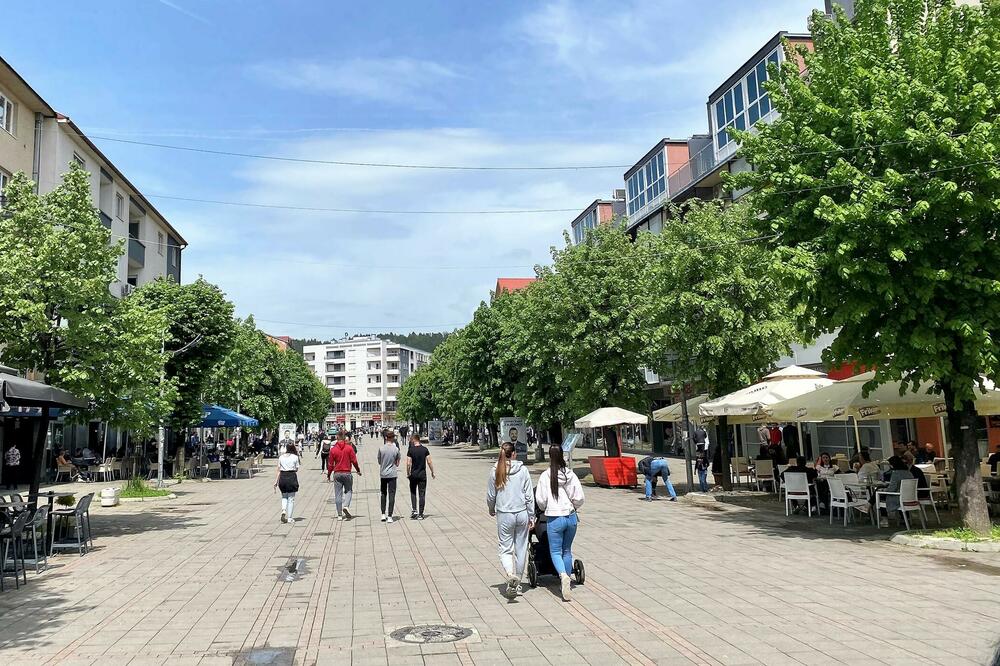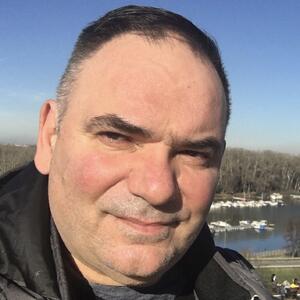In the XNUMXs, before my first book came out, my Beran friends Tufko and Reki sent three of my poems to a competition at a famous poetry festival near Podgorica. They didn't tell me anything. I was taken aback when I received an invitation to a festival I hadn't signed up for. Then I spent several exciting days visiting Podgorica and Cetinje - for the first time someone in Yugoslavia recognized what I was doing.
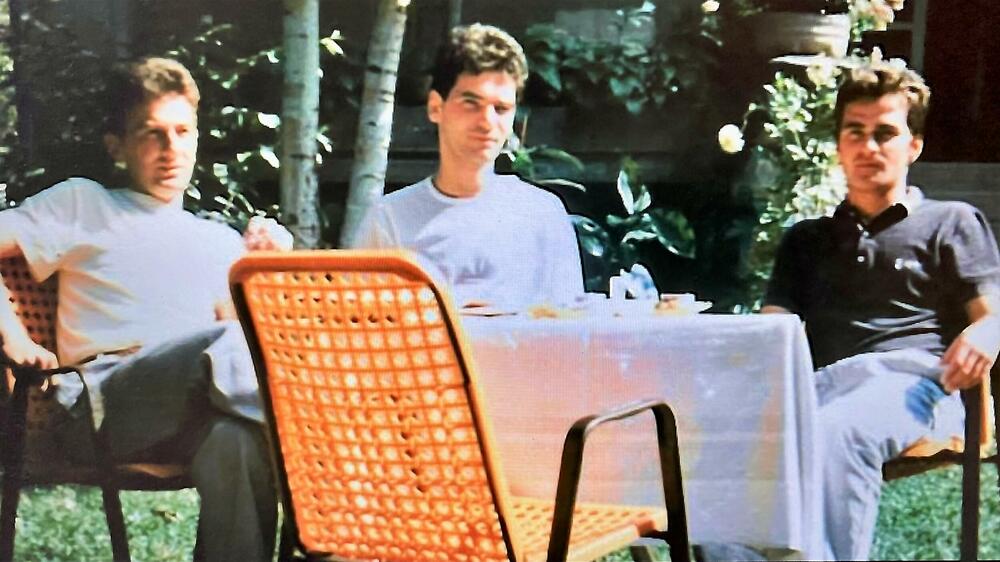
After that, decades of literary rituals followed, the books I signed were published in Sarajevo, Tuzla, Belgrade, Novi Sad, Karlovci, Split, Klagenfurt, Skopje. But not in Montenegro. Where the birthplace of my surname is, it was not on the cover. It didn't particularly bother me, I'm not one of those people who would disturb the natural flow of things. I am not interested in bloody literary clans, nor in the race for political sinecures, which have long afflicted the literary drive of the Serbo-Croatian speaking area.
But now, when I'm invited to Berane, I'm looking forward to many things. Meeting with friends, meeting with relatives, meeting with the audience. There is deep justice in that, that my first official literary visit to Montenegro this millennium is taking me to Berane. I didn't grow up there, but since it's my father's hometown, I go to my friends and relatives when I get there - and I don't get there as often as I'd like. I cannot be a stranger in Polimlje. Or, as Tufko jokingly told me, you can feel like a Japanese but here you are Vasojević and Dedović.
The customs officer recognizes you
Taught by experiences from various trips, I avoided the customs officer's gaze at the Podgorica airport. If you look him in the eye, he may stop you and the boring procedure of opening the suitcase will follow. But that customs officer I passed, he said in a woman's voice. "If I were you, Dedović, I would at least contact you!" Jasna, from Belgrade, married to Goran, whom I met as a talented painter in Berane in the eighties, has been living with her family in Podgorica for decades. I haven't heard or seen Goran for a long time, I went to Germany in the XNUMXs, as a lawyer in Belgrade, like the entire middle class at that time, he balanced on the edge of survival in the time of sanctions and undeclared wars. He moved with his family to Podgorica and made a career there in the turbulent decades, first in intelligence, and then in diplomacy. I'm glad to see Jasna, I took Goran's number from her.
From the airport, we drive first on the highway, and then in the direction where they are doing something, along Tara, and then along Lim. The sky descended on the Montenegrin hills. The rain. We arrive by appointment at the Berane hotel - I remember it from socialist prehistory, now it is really like new, it has been beautifully renovated. My friends booked me a room with a view of Lim. I'm standing on the terrace and watching how the "Plavski Bey" powerfully rolls its rapids under my feet, filled with rain and melted snow.
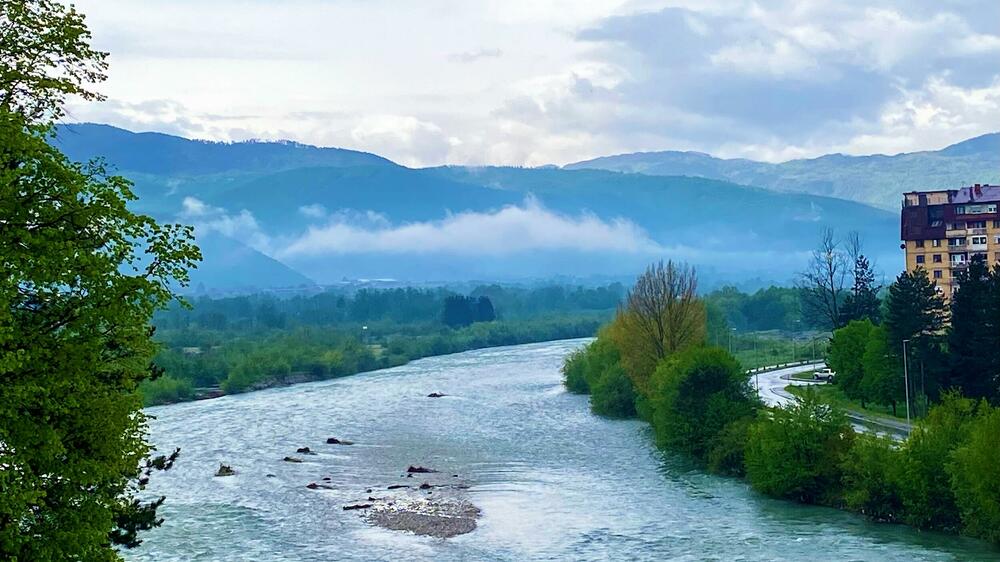
Its green color, by which I remember it, comes to life only when the sun breaks through the dark clouds towards the water. But that is enough to remember the summers spent in the garden of the Softić house, which can be seen from the balcony on the other bank as an oasis of conifers surrounded by buildings.
Beran Korza
We pass the main street, which today bears the name of Mojsija Zečević. So far, they have counted a total of eight names of that street. Mostly these were the names of the rulers who in the last century changed like on a conveyor belt - from Montenegrin, Serbian and Italian kings to Tito. Berane still has a corso - this custom of strolling around the main street existed in almost every Yugoslav town, only to slowly disappear in this century. But the local people still go for their walk in nice weather.
Perhaps the reason should be sought in the width and beauty of the main street. Many larger cities do not have such. In the boulevard's wide pedestrian zone, you can recognize the handwriting of a Sorbonne student, the Ottoman civilian administrator of Beran at the time of the founding of the garrison town in the 19th century - his name was Rizvan-bey. This man wanted his city to resemble European towns. Hence this generous width that surprises a man when he first faces a town of twelve thousand inhabitants.
First, we meet Tufik Softić Tufko, Remzija Ramusović Reki and Marko Radojević on the hotel terrace. The first two are generational companions, we have been friends since the eighties. And Marko, who was just born at the end of that decade, is actually the man to whom I owe this meeting. This professor at the Beran High School commented extremely positively on my travelogues on social networks, and expressed his wish to meet the high school children. Then, meeting Tufko, he found out that we studied together. The two approached the vice president of the municipality, Damjan Ćulafić, who, as a politician, advocated for a new cultural project. People from the region who have something to say will come to Berane. I was supposed to be the first in a series of guests of the "Weekend in Berane" program.
With the Government in Grudice
On Sunday morning, a trip to my father's native village awaited us. The brothers Ljubiša and Milić come to pick us up in an all-terrain vehicle. Behind the wheel is Ljubiša's son Vladimir, he has barely turned 18 years old, and he will prove to be a reliable driver.
We stop at the church of Saint Michael the Archangel in Andrijevica to buy candles. It was built in 1887. The foundation stone was laid by Prince Nikola. Since the village churches-log houses were often burned in the Ottoman revenge campaigns, every rifleman from Gornji Vasojević would bring a stone for the church. So I am standing in front of the collective endowment of this region.
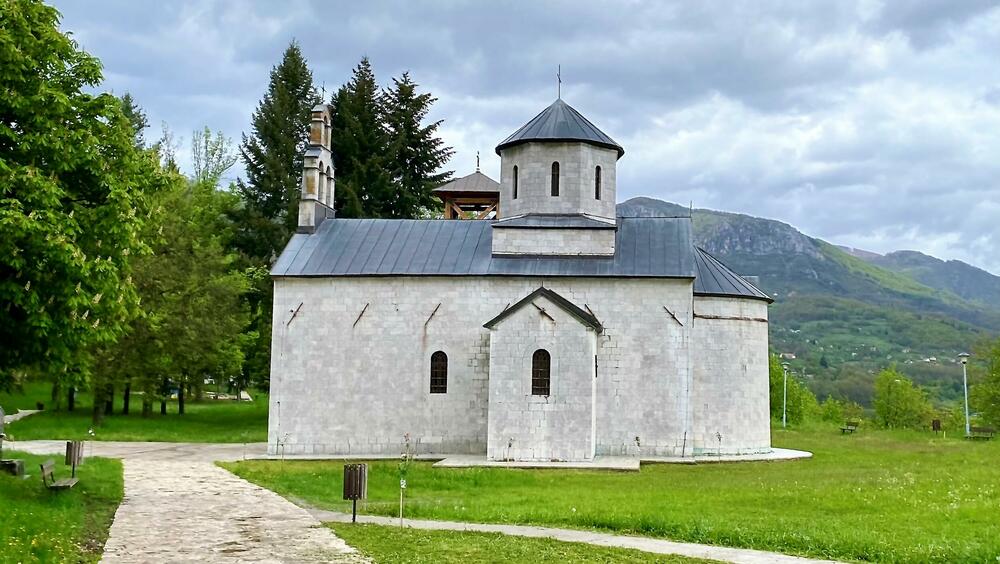
Then we cross the Lim at the place where in my earliest memory of these parts there was a wooden bridge. Now it is a fairly stable concrete structure of a blue fence. The village of Gračanica nestles on the left bank of the Lim. We had to climb above 1000 meters above sea level, where the village of Grudice is located. The sky fluctuates between gray and blue. The nose of the jeep rises higher and higher. Then the asphalt stops. My companion spent her entire life in the plains environment. I can see the anxiety in her eyes when she looks down at Lim. On the other side, towards the east, you can see white peaks that are already counted in Prokletije. We emerge from the forest into a clearing and reach the cemetery.
We struggle to light the candles, the mountain wind blows them out.
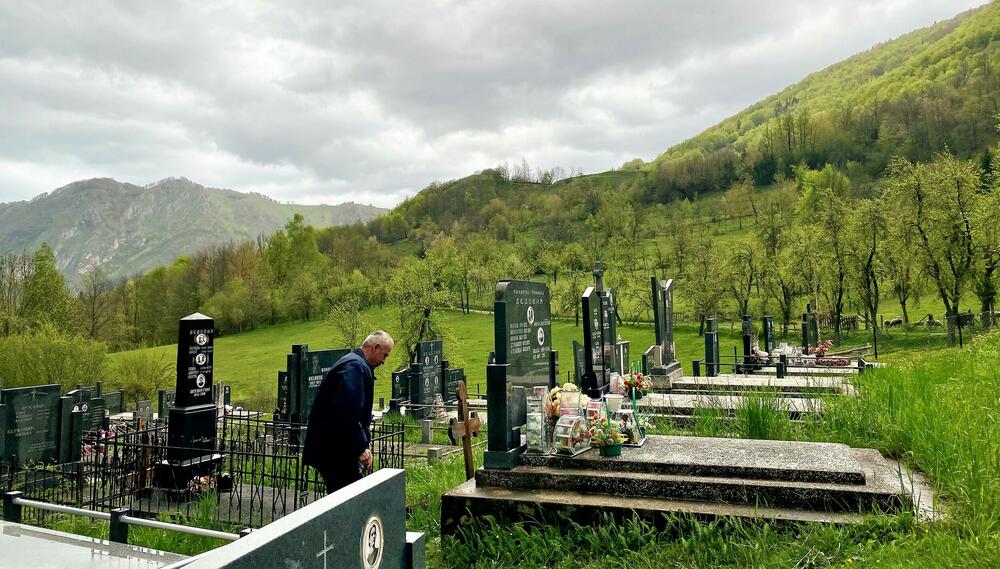
Uncle Milija died in 2017. I remember him as a vital, calm and nice man. He had that fundamental honesty in him that adorns good hillmen - it could also be called nobility. I stay a little longer at the common grave of grandfather Miljan, grandmother Poleksija and their son Vukman - my father. A neighbor approaches us, tending sheep in the meadow next to the cemetery. Praise my late father - he never passed by her children without giving them candy. That's what he says to a sixty-year-old boy who never got those candies from his father. As well as the other three children from his two failed marriages. Each of us has many faces. Here, the good father's face is remembered, the others as if they did not exist.
Aunt's good eyes
Strina Mirosava is 88 years old, she has a clear mind. The handwriting of a lived life on her face. She gave birth to nine children, my brothers and sisters - Vera, Ljuba, Rada, Veselinka, Rajko, Žarko, Milić, Ljubiša, Marko.
Rajko died. And here, in a mountain village, in a beautiful house, she and Marko welcome us. The warmth of "Smederevac", the warm words of my grandmother. Clear Gračanica brandy, cheese and dried meat, as medicine.
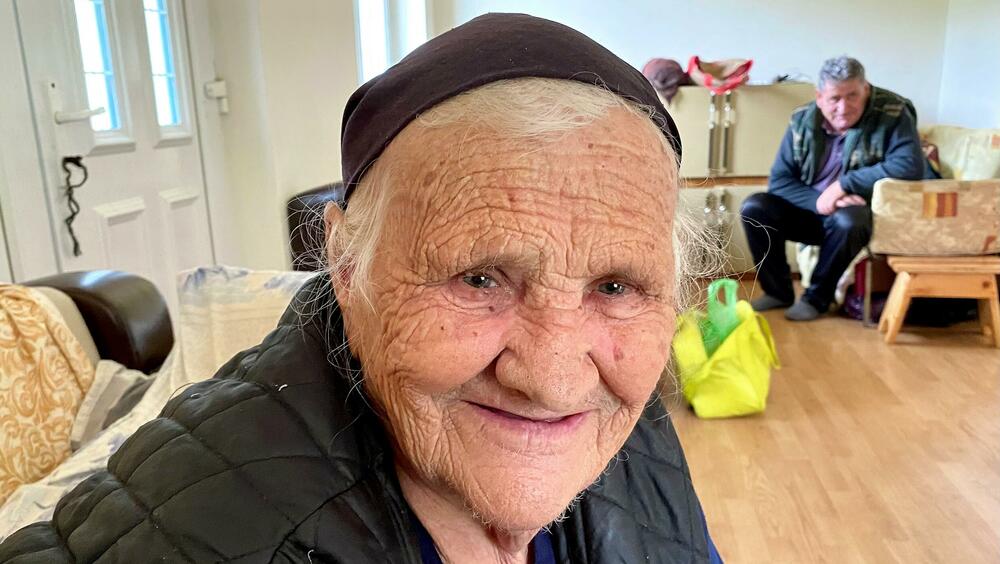
Already gray-haired aunt's sons in lively kinship conversation. This warmth cannot be paid for with anything. I toast my uncle's picture on the wall. I miss him too.
Then we climb by jeep to the highest point in the village, which the locals call Selište. I recognize my grandfather's meadow with the red hollow brick house where my father died. Next to it, the stone foundation of the grandfather's house, which collapsed long ago, has grown into the bushes. Some forest on the slope, then a meadow like a slide, and behind it, in the depth, Lim. Snow on Komovi. I will read the following words later in the book "Take the book" by the Andrijevac poet Darko Jovović: "And almost a century ago, doctor of philosophy, writer, professor, theologian Radoslav - Jagoš Velišin Vešović, wrote that a house should not be built where the Komi can't be seen". Djedo Miljan should not have been told that. His house was a lookout point in front of the three peaks of Koma. That's what he saw first thing in the morning when he stepped on the doorstep. Again, I have a feeling that it is not only me, but also the invisible line of Dedović, who is walking this way, through the blossoming meadow towards Komovo. They now have only my eyes and my voice.
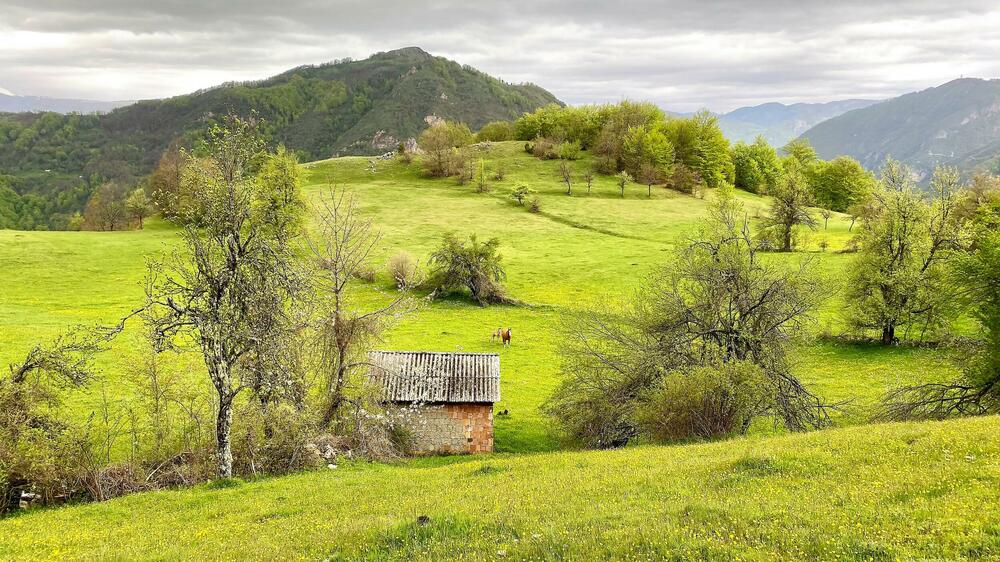
On the way back, we stop by the family of Dragan Dedović. He is a pensioner from Belgrade who lives here with his wife for half a year, as long as the weather is nice. He keeps beehives in the yard. We drink coffee and brandy, we take honey that does not need an ecological certificate. Up here, the bees are beyond the reach of civilization's toxins. Dragan asks me why I haven't written about this area for a long time. Maybe my reasons are buried in the sad beautiful village cemetery. But here I am writing.
I also remember Vukomir Dedović, with whom I spent the night last time here. And he is gone. He died suddenly here, but was buried closer to his family, in Vojvodina. One of those candles was for him. In the evening we sat with brother Ljubiša, daughter-in-law Milanka, they have golden children. Sisters and brothers also came. Such evenings serve to pour kinship affection into the flask of the soul, and drink it as a precious elixir of memory in the days of solitude.
Lower the tone, raise the argument
Early that Monday morning, I had coffee with the vice-president of the municipality, Damjan Ćulafić, in the representative municipal building. Ćulafić was an interlocutor with a broad education, a young man with a measure, it was raining outside, but we had to move on. I had a scheduled interview with high school students. I stood in front of the building that my father entered nine decades ago.
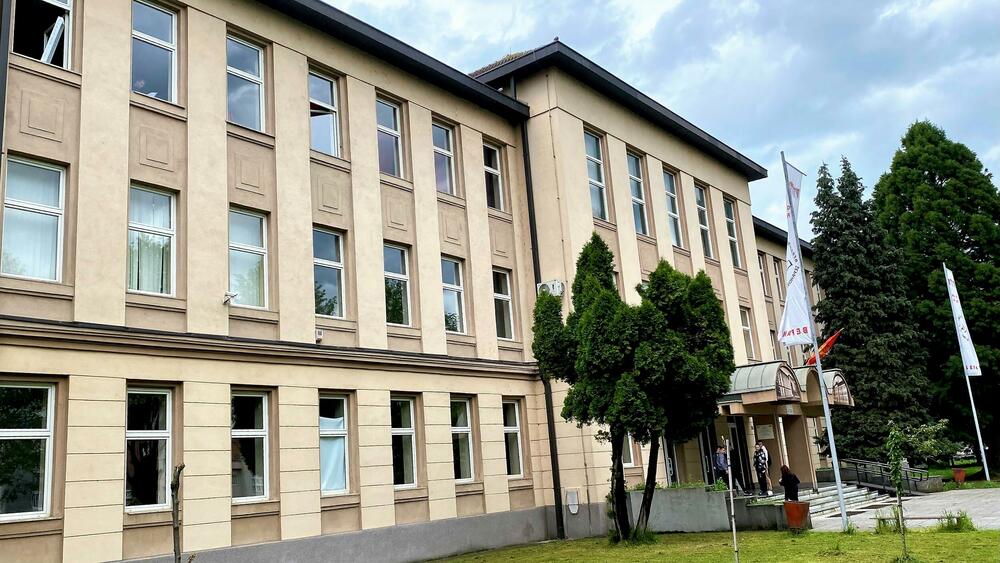
The gymnasium was founded during the reign of King Nikola in 1913, and this building was built twenty years later during the reign of King Alexander. Over time, it was called the "Sorbonne of Beran". It has given more than two hundred doctors of science, over twenty academicians, writers and artists, it is difficult to count them. Among them are people without whom the development of my reading taste is unthinkable - Mihajlo Lalić, Miodrag Bulatović, Radovan Zogović, Ćamil Sijarić.
Based on the way the high school girls and boys greeted me, their questions and the energy we exchanged in an unexpectedly long conversation, I am convinced that this great streak will continue. Their clear, curious eyes, their smart questions, their politeness and moderation - convinced me that these young beings are real treasures in this toxic world. I am honored to meet them. Some of them are members of one of the most successful debate clubs in Montenegro, led by Marko, and the motto under which they grow up could be recorded at the entrance to the parliaments of all post-Yugoslav countries: Lower the tone, strengthen the argument.
Home of sobriety
At noon, I participated in a podium discussion on the floor of the beautifully decorated Polimski Museum. There were also relatives and friends and curious people in the audience. I won't recount what was said, after all Tufko made sure that the whole thing ended up on social media as a recording of Radio Beran. I recharged my old literary batteries because I have rarely experienced so much favor. Afterwards, we hung out among the museum's historical artifacts. Marko drew my attention to a unique body armor shirt with a hood from the 14th century. The longer I looked at her, the more clearly the face of the warrior of that time, similar to my own, emerged from her emptiness in my imagination.
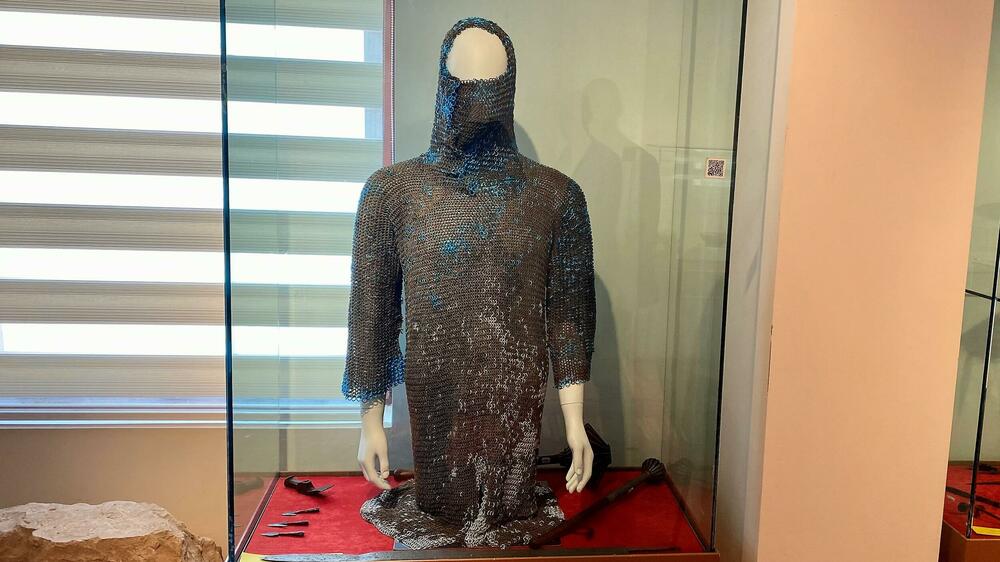
I also met local writers. Ljerka Petković, a high school teacher and poet, gave me several of her books. She too has a Bosnian past, and her life is measured by the break from the nineties. Knowing this, I read her verse differently: "And now we are here, satisfied, more or less, but aware that we love all those special, terrible, brilliant and dark roads behind us". I met - and already quoted - Darko Jovović. His records about Polimlje and the "white plague" below Komovo make him a chronicler of the destruction of his homeland. I especially like his poem about ancient reapers whose graves are overgrown with grass. I also took his books with me to Belgrade.
All this took place in the museum building, in the former "Home of Sobriety" - that was the original name of the building created for the Kingdom of Yugoslavia. In the XNUMXs, Reki's studio was located there.
Former me and Alba
Reki confronted me with a character I'm no longer sure I knew very well - the me from decades ago. He took out on the table a "file" from which my letters appeared, postcards from Kalesija and Belgrade with postmarks from the eighties, a text I wrote about his drawings and paintings. All this activated the threatened corridors of memory in me - my personal archival material did not survive the war.
At one point, Tufko, his wife Nada, their daughter, Reki and I stayed at the table on the terrace above Lim. In these few days, there were few moments without crowds - the friendship from the eighties connected us for life.
That weekend, Marko took us to the Ivangrad cafe, where we talked over iced beer as if we had known each other forever. He told me a local story about the unfortunate beauty Alba, who was married to the very Turkish architect who designed the main street. Story or legend, the boundaries here are unclear anyway, it says: Alba fell in love with an Orthodox man, a vile eunuch from her husband's house discovers the adultery, she throws herself into the whirlpool, into the arms of "Plavski Bey". And Lim swallowed her forever.
The night before departure, I stand on the hotel balcony, at the place where the rock from which the beautiful Alba jumped to her death used to be. The tin rustles from excess water. It's rainy spring.
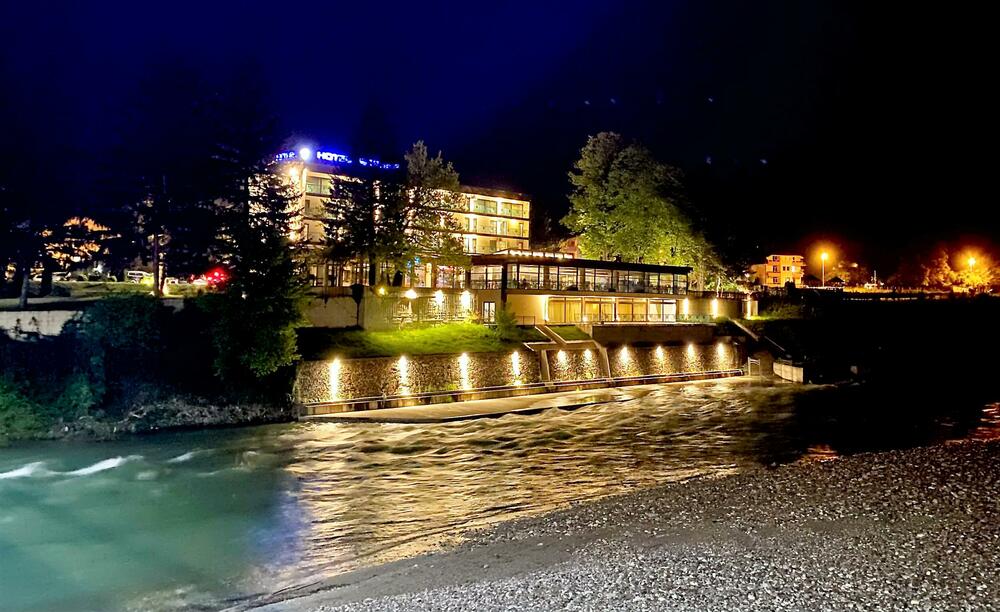
Tomorrow, Tufko will hear from our friend from the studio, Momira. He'll give me the phone. We hadn't heard from each other for decades, and we talked as if we had parted yesterday. In Podgorica, I will use the number from the beginning of the text that Jasna gave us. I will see Goran Poleksić and I will talk to him about these days. He told me about Romania and politics. I think he also fondly remembers our gatherings in Beran, he just rarely mentions it. He is retired and intends to draw again. Velizar, a colleague from the Sarajevo studio, will also surprise me at the airport. Another cordial flash meeting. I will think, already tied up on the plane, that in fact I have so many people here with whom I would have to sit like a man, that it would take me a very long time. Or I need to stop by more often.
Bonus video:



